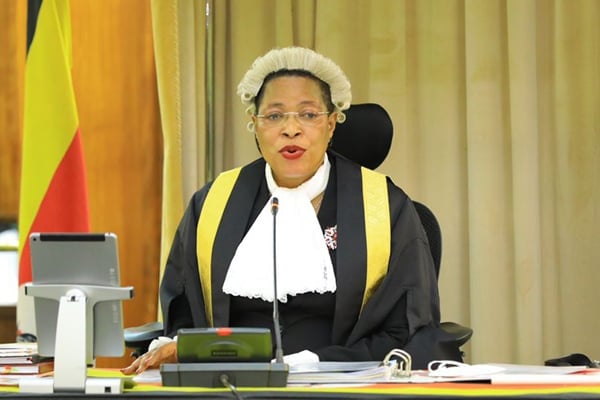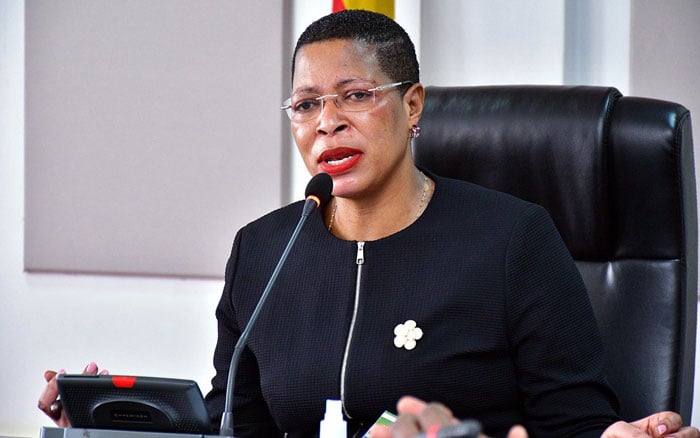
Speaker Anita Among
The quick ascendancy of Speaker Anita Among to the top of the greasy pole in politics could match what political analysts believe will be a dramatic end of a fairytale dalliance with the ruling party beholden to Machiavellian state-craft.
On Thursday, the United States sanctioned several officials over ‘significant corruption and gross violations of human rights’ which targeted the Speaker, junior Finance minister Amos Lugoolobi and the recently sacked minister for Karamoja Affairs, Mary Goretti Kitutu and her junior counterpart Agness Nandutu, as well as their spouses. Apart from the Speaker, the three are facing a trial in the Anti-Corruption Court for allegedly stealing iron sheets meant for Karamoja, one of the poorest sub-regions in Uganda.
The sanctions extend to the former deputy Chief of Defence Forces, Lt Gen Peter Elwelu, who is accused of violation of human rights during and after an attack on the Rwenzururu kingdom palace in November 2016. More than 100 people, including children, were killed in the raid Lt Gen Elwelu commanded.
The stoic Among has remained defiant amid the accusations and on the contrary, accused the West of concocting evidence as she faces isolation from the United Kingdom and the United States, with fears that the sanctions could extend to the tripartite alliance drawing in the European Union. She is also facing a probe at the domestic level by investigating agencies, including the Inspectorate of Government.
Five years after crossing from the Opposition FDC party, Ms Among endeared herself to President Museveni by undertaking sensitive covert roles. A vital cog in the wheels of the NRM, she appeared indispensable after she was elected as the Deputy Speaker and later as the Speaker after her predecessor, Jacob Oulanyah died in the United States, on March 20, 2022.
But at her hour of reckoning, on Tuesday she posted a comment on the micro-blogging site, X, denying owning a house in the United Kingdom and claimed it was part of “internal political contradictions and intrigue” orchestrated by her rivals to bring her down.
Genesis of trouble
Pesky questions about the Speaker’s expenditures were first asked when Agora Discourse, a local watchdog organisation led by Agather Atuhaire, a journalist and lawyer, and Dr Spire Ssentongo, a lecturer of Philosophy at Makerere University, exposed on X, allegations of dubious withdraws worth billions of shillings on personal accounts of staff under what they claimed was a pretext by her office to conduct corporate social responsibility activities across the country.
Agora also revealed that the Speaker chaired a meeting on May 6, 2022, which illegally doled out a service award worth Shs1.7b where a substantial amount of Shs500 million was given to former Leader of Opposition Mathias Mpuuga. Lawmakers led by Theodore Ssekikubo (Lwemiyaga County) are currently collecting signatures to censure the four commissioners, who are accused of benefiting from the ‘illegal vote’ and according to sources, so far about 123 signatures have already been collected.
These reports turned into fodder for intelligence outfits who had earlier on crafted their dossiers about how the Speaker was allegedly using her coveted position to build a power base. Whether the intelligence reports were embellished or legitimate, there was a plausible case regarding the amounts of funds that were being moved across different personal accounts belonging to her surrogates, a source revealed.
Highly-placed sources claim that it is part of cogent evidence that Western powers relied upon to build a case against Speaker Among.
With the risk of Uganda turning into a pariah state in the Commonwealth and across the West including the United States, which has previously provided large military and financial aid to Uganda, political science lecturer at the North Carolina State University, Dr Moses Khisa, predicts that this once again shows how power is transient.
“When you think about it, the implications of the UK sanctioning a Ugandan Speaker of Parliament are enormous. Uganda is a member of the Commonwealth, and there are all sorts of engagements, official and otherwise, involving Uganda and the UK that would involve the Speaker,” he said. “With the sanctions, the Speaker can’t get involved, officially, and can’t travel. These restrictions most likely apply to the US and the EU as well. What you have is the number three official in the government of Uganda who is a pariah and unwelcome in most of the Western world. This is dire.”
Bite of sanctions
The Speaker might also possibly be barred from attending the 67th Commonwealth Parliamentary Conference slated for Sydney, Australia in November 2024.
Facing a travel ban to the United Kingdom and transacting through an interconnected global monetary system, amplifies the impact of sanctions on individuals and can lead to financial hardship, and limited access to essential goods and services.
“The optics are very bad, whichever way one looks at it. The Speaker of Parliament is the third top person in the power hierarchy in Uganda, so for a major Western government to sanction her is huge,” Dr Khisa noted. “She’s the highest Ugandan government official to be sanctioned, which to me suggests the US government and its top ally, the UK, have changed course and are willing to take measures that were previously unthinkable.”
Prof Philip Kasaija, who teaches politics and international law at Makerere University, agrees with Khisa, adding, “Presumably, [Ms Among] will not be the Speaker for a long time.”
Kasaija argues that the broader issue is that Western countries have woken up and have now taken a stance against corruption. “This move, he adds, “is meant to stamp out impunity. We have laws and policies but it’s talk and there is no action.”
Kasaija says whereas it’s true that it’s incumbent upon the United Kingdom to prove these allegations, “international politics and diplomacy demands that this evidence may be sent directly to the President and investigating officers.”
Telling letter?
The tone of the President’s letter dated May 23 addressed to the Speaker, Foreign Affairs minister and the ombudsman illustrates the nature of communication, which continues to remain outside the public domain.
“I have got information to what you told me that you indeed own a house in London in the form of flat 4, Silk House 7, Waterden Road, London E20 3AL, United Kingdom. Do you own it or are you renting it?” Mr Museveni writes.
“By the copies of this letter, I direct the Minister of Foreign Affairs to contact the UK government and get details regarding this house. The IGG is also informed.”
“Since the UK government claims I own property, it should be prudent of them to state which property I own as Anita Annet Among,” the Speaker responded on the microblogging site, X.
“Forgery should be the least the world can expect from them. I am sure this is the answer my President, our government, and myself want from them. Nothing else.”
Kasaija says the Speaker is right to demand that the United Kingdom provide “the smoking gun”, but finds it odd for a country with such a sophisticated intelligence network and a globally interconnected financial system to make false accusations against the third highest-ranking officer of a Commonwealth country.
The nature of sanctions, which are targeting the Speaker are unilateral and naturally clash with the foundational principles that regulate and govern international relations as stated in the Charter of the United Nations and the 1970 Declaration of Friendly Relations and Cooperation among States. However, the exponents of unilateral sanctions argue that these sanctions are designed to disempower governments, organisations, and persons for such reasons as state sponsorship of terrorism; regionally destabilising uses of armed force; usurpation of democracy; widespread and systematic human rights violations, and corruption.
Implications
Dr Livingstone Ssewanyana, who is the executive director of the Foundation for Human Rights and is an independent legal expert on international order, told Saturday Monitor: “First of all, sanctions by their nature are an expression of discontent amongst states, some of these sanctions are unilateral whereas under international law we normally impose them through the framework of the United Nations.”
He, however, says sanctions against the Speaker indicate a worrying trend that some states are increasingly getting uncomfortable with the level of corruption in Uganda.
“They should not be seen in isolation with other targeted government officials. Uganda can no longer afford to do things the way they want. It is a wake-up call that the Ugandan government needs to clean its house; that states will not look while abuses and transgressions are committed,” argues Ssewanyana.
ICT minister Chris Baryomunsi has argued that the sanctions violate the principle of sovereignty as the Ugandan government had already commenced the trial of those accused of stealing iron sheets.
He also says the sanctions flout the principle of a fair trial provided in the Constitution, which underpins the suspects’ presumption of innocence. Among has framed the sanctions as a neo-colonial tool meant to punish her for chairing the House plenary that passed the Anti-LGBTQ law.
But Khisa says: “The argument that she’s being targeted unfairly because she hasn’t been charged with a crime let alone convicted is neither here nor there. What it means is that the sanctioning state believes the Ugandan government is either unable or unwilling to charge and prosecute powerful officials engaged in wrongdoing. So, the US and UK governments are saying, hey, because you can’t act against the powerful alleged to be involved in corruption, we will do it for you! You can call that neocolonialism, but that is what it is.”
Speaker’s fate
Speaker Anita Among could be compelled to carry her cross as Uganda’s halo continues to slip with its erstwhile allies in the West. However, there is still a glimmer of hope that Uganda, which receives nearly $1b in aid and remains a major ally of the West in the war against terror and a stabilising force in the volatile Great Lakes.
This modicum of respect has been displayed through the cordial meetings that the Chief of Defence Forces, Gen Muhoozi Kainerugaba has recently held with the Head of the EU delegation in Uganda, Jan Sadek the US Defence Attache Lt Col Chris Noumba. He also received a congratulatory message from the British Chief of the Defence Staff, Admiral Sir Tony Radakin KCB, ADC, which was delivered by the UK envoy to Uganda, Kate Airey.
Prof Philip Kasaija, a lecturer at Makerere University, says the undertones of the Anti-Homosexuality Act in influencing sanctions will not dissipate but overall the President seems to have taken the correct path by engaging in due diligence. “Even the Western countries will be impressed by the President because that is due process, a day is very long in politics, let the Speaker not chest thump, if she does not own this thing, then she will be cleared.”
Article 79 of the Constitution empowers Parliament to make laws, protect the Constitution, and promote the democratic governance of Uganda. The House also plays the vital role of oversight over the Executive. Can the Speaker meet the fit and proper test to preside and protect the sanctity of the House in light of the accusations she faces?
Dr Livingstone Ssewanyana, who is the Executive Director of the Foundation for Human Rights, says as a sovereign state, it is only the Executive and citizens that can determine this question. For now, Speaker Among remains innocent until proven guilty—the golden thread of the criminal justice system.



